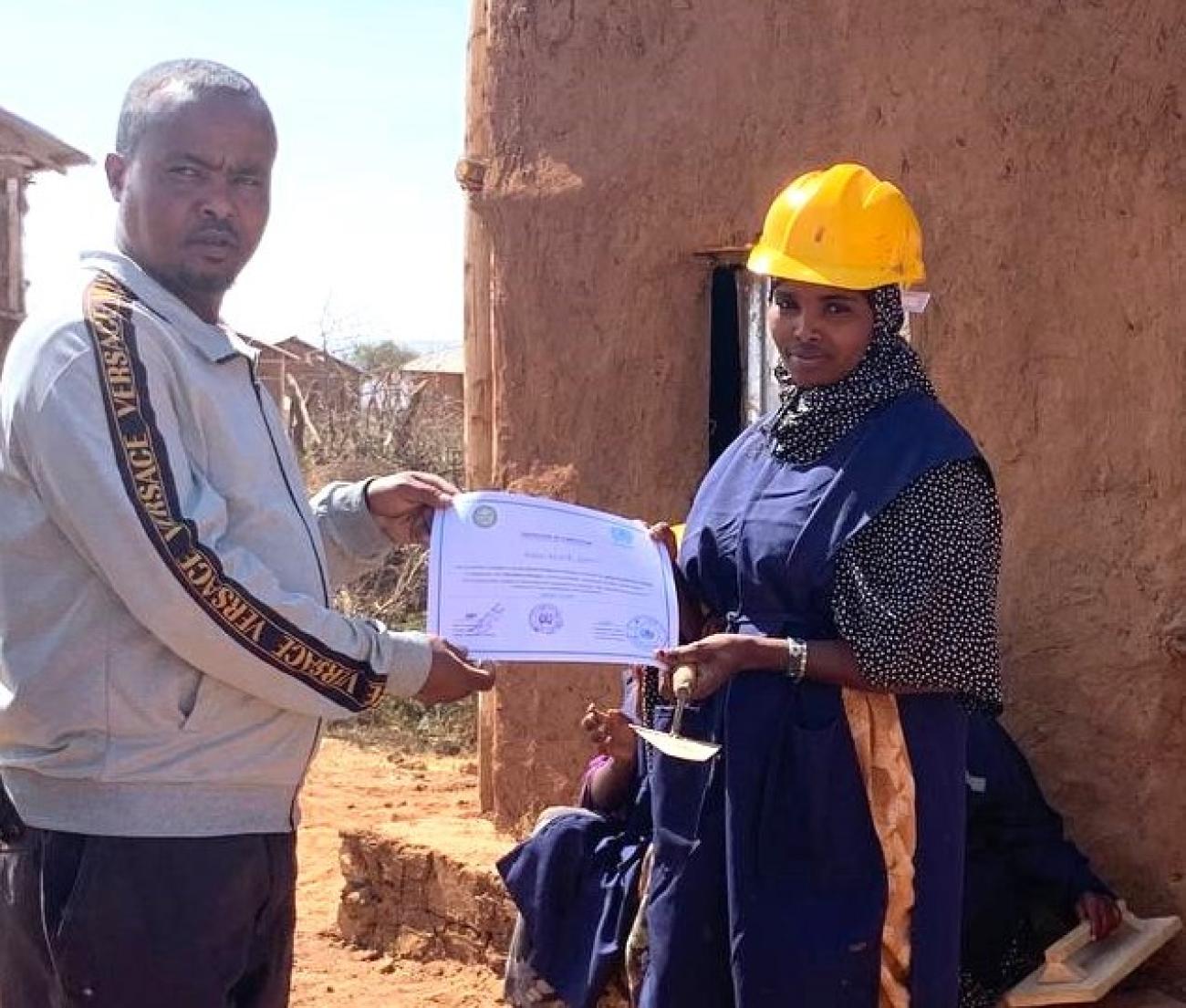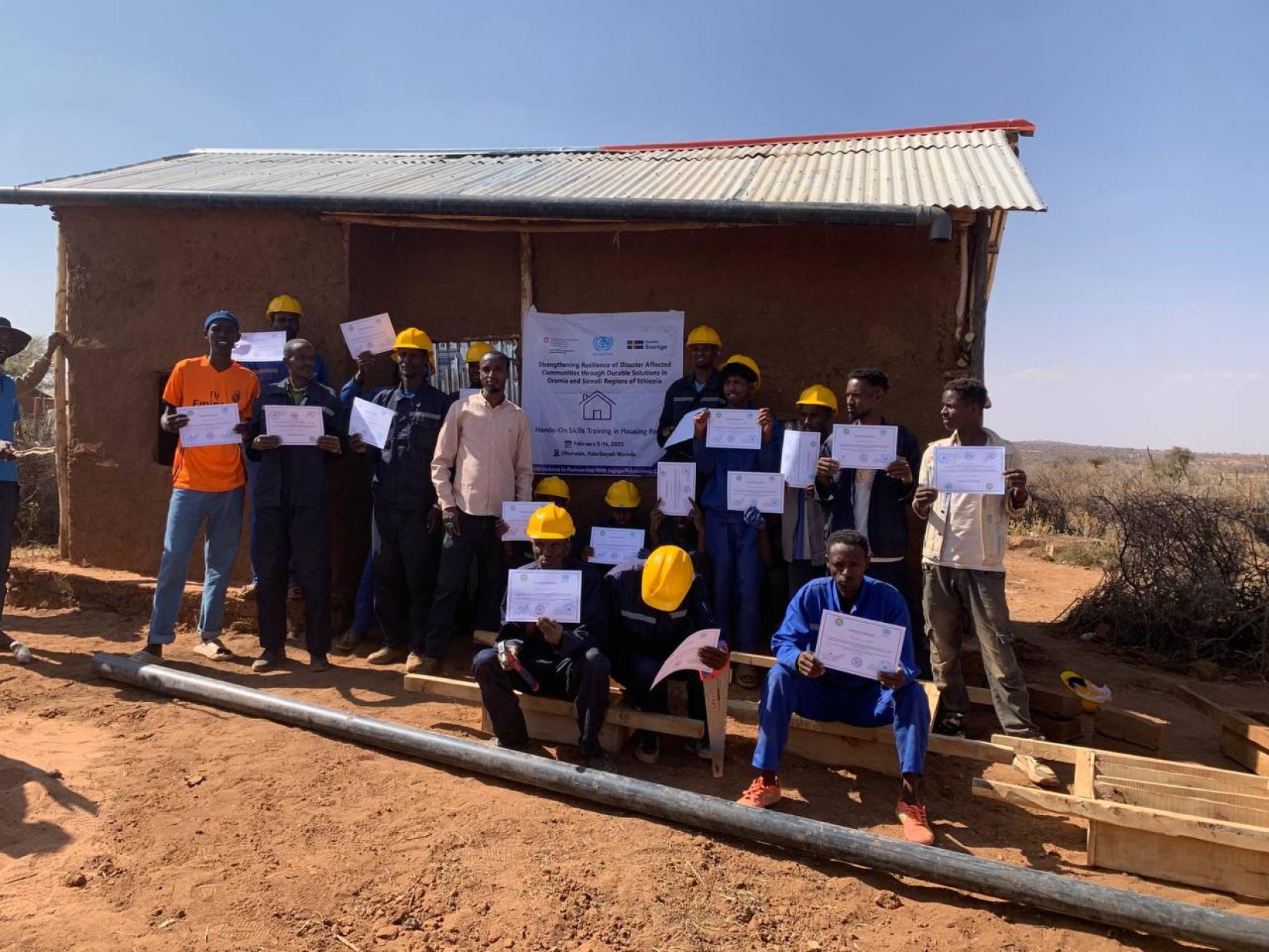Building Resilience: Transforming Lives in Ethiopia through Skill Development

In the arid landscapes of Ethiopia, two individuals, Ifrah Beshir Ahmed and Abdulkader Areb Ibrahim, known as 'Dekere,' have embarked on transformative journeys
Through their engagement in the UN-Habitat initiative, they are building their lives and communities through resilience and newfound skills.
Ifrah Beshir Ahmed: A Journey of Empowerment and Community Building
At just 20 years old, Ifrah Beshir Ahmed has already faced significant challenges. A relocated woman, she had to leave school after the eighth grade due to marriage. Now divorced and a devoted mother to her three-year-old daughter, Ifrah lives with her mother in a house in desperate need of repair. Before her relocation, she supported herself by selling coffee, tea, and sometimes food. However, in her new environment, business has been slow, making it difficult for her to sustain an income. With no prior knowledge or experience in construction, she felt uncertain about her future—until she heard about a skills training program in her community.
Determined to change her circumstances, Ifrah joined the program, hoping to learn something new that could help her rebuild her home and support her family. Initially unsure about what to expect, she soon discovered a world of opportunity. Through the training, she learned essential construction skills, including setting out and building masonry foundations using mud blocks. Although she missed the initial lessons on making mud blocks, she eagerly absorbed knowledge from others who had learned before her. “I can’t wait to build the foundation,” she said, her eyes shining with excitement. “It’s empowering to know that I can create something with my own hands.”
As the days passed, her confidence soared. She mastered the art of setting out and building masonry foundations, learned to mix materials for plastering, and discovered how to reinforce structures with binding materials. The once timid young woman, unsure of what the future held, was now standing tall—strong, skilled, and full of purpose.
But the most unexpected gift was not just the knowledge she gained, but the sisterhood she found. Working side by side with other women, she realized she was not alone in her struggles. Together, they were not just learning a trade; they were building something far greater—a community of women determined to uplift one another.
Her older brother, who is also part of the program learning carpentry, inspired her further. While he does not live with them, she hopes to learn carpentry skills from him in the future, adding even more value to her knowledge. Ifrah is not just thinking about herself—she wants to pass on what she has learned. She and her fellow trainees are planning to teach other young women in their community who have not yet had the opportunity to participate in such a life-changing experience.
When asked what advice she would give to other girls facing challenges, her answer was simple but profound:
“Always strive for better. Hard work pays off, and learning new skills is crucial. Never let your circumstances define you.”
Ifrah is deeply grateful for the opportunity that changed her life, but she knows that true transformation goes beyond personal success—it’s about igniting change in others.
“This training has created a buzz in our community, a noise that has motivated all the youth. It’s something we haven’t heard in a while, and it’s truly amazing. Thank you.”
Ifrah’s story is more than just one of resilience; it’s a story of hope, empowerment, and the unyielding power of community. She is not just building walls; she is breaking barriers. She is not just constructing homes; she is shaping futures. Through her determination, she is proving that no matter how broken the past, the future can still be built—one brick at a time.
Abdulkader Areb Ibrahim, aka ‘Dekere’: Brick by Brick
At 41 years old, Abdulkader Areb Ibrahim, affectionately known as "Dekere," is no stranger to hard work. A devoted father of seven children, he lives in a crowded home alongside his elderly mother, wife, and children. Life has not been easy since his relocation, which left him unable to continue his driving job that once provided for his family. "I used to have a driving license. Back in Mechara, I could make a living out of it. But here?" he shakes his head. "I couldn't even find someone willing to let me drive their cars, let alone a job."
Despite these hardships, Dekere has never been one to sit idly by. He calls himself a workaholic—a man who thrives on purpose and doing something with his hands. When he heard about the skills training program, particularly the masonry component, he saw an opportunity not just to rebuild his home but his livelihood. "I had some experience making blocks back in Mechara, just a little," he admits. "But here, I wanted to do more than just remember. I wanted to master it."
Through the training, Dekere has learned how to make mud blocks and construct masonry foundations. More than just hands-on work, he gained something he never had before: knowledge of how to calculate the number of blocks needed to build a house. "It’s a simple concept," he chuckles, "but I never thought about it before. Now, when I look at a wall, I don’t just see bricks, I see numbers, calculations, and possibilities."

The training has given him renewed energy. Every morning, he wakes up excited, knowing there’s something new to learn, something to create. "It's been a long time since I felt this motivated. I used to wake up worrying about what work I’d find that day. Now, I wake up knowing that I have a skill to build on."
Dekere is also keenly aware of the economic potential this training holds. With a certificate in hand, he hopes to secure work in Kebribeyah or Jigjiga, where construction jobs might be available. But beyond that, he sees a future in his own community. "Most houses here need repairs, including mine. Now, I know how to fix them. And not just that—I can teach others, work with my neighbors, and maybe even turn this into a way of earning."
As the interview wraps up, Dekere’s eyes light up with a mix of determination and pride. "You see, I believe in hard work. A man must know something, must have a skill to survive. And now, I have another one to add to my list."
With hands rough from labor but a spirit unshaken, Abdulkader Areb Ibrahim is not just building houses—he’s building a future.
These personal transformations are part of a broader initiative by UN-Habitat, aimed at strengthening the resilience of disaster-affected communities in Ethiopia. Through projects like the "Strengthening Resilience of Disaster-Affected Communities Through Durable Solutions in Oromia and Somali Regions of Ethiopia," UN-Habitat provides fit-for-purpose shelter upgrades and housing repairs. By offering practical training in construction, these programs empower individuals like Ifrah and Dekere to rebuild their homes and communities, fostering self-reliance and economic development. UN-Habitat's commitment to sustainable urban development ensures that such initiatives are tailored to the unique needs of each community, promoting inclusive growth and resilience.
The collaborative efforts of UN-Habitat and local communities are paving the way for sustainable development in Ethiopia. By equipping individuals with essential skills and resources, they are not only rebuilding physical structures but also restoring hope and dignity to those affected by displacement and adversity.


